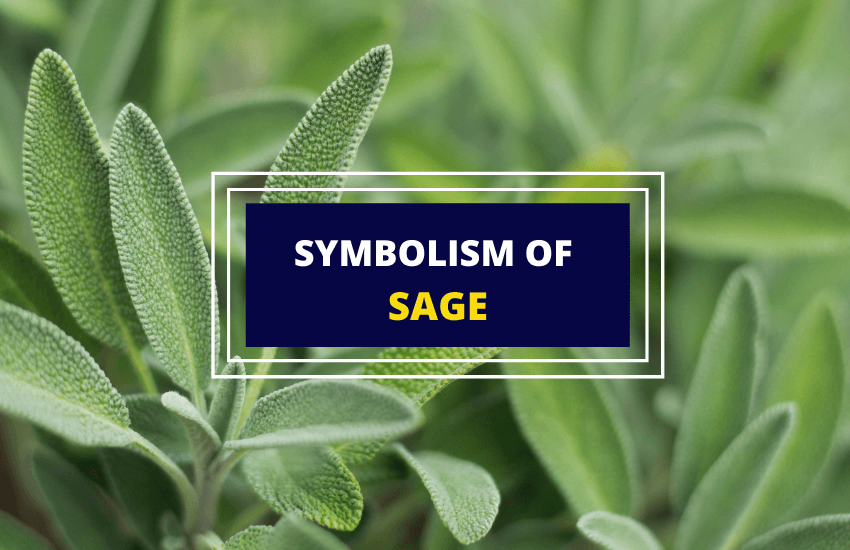
Table of Contents
A popular herb used in cooking, for herbal teas, and to cleanse negative energies, sage has been valued since ancient times. The herb also holds deep symbolism. Here’s what it means.
The Origins of the Sage Herb
Salvia, popularly known as sage, has tubular-shaped flowers with aromatic leaves. It belongs to a genus of over 1,000 perennial or annual herbs and shrubs and is part of the largest genus in the Lamiaceae family. Its name is derived from the Latin word salvare, which translates to heal and to be healthy.
Sage has gray-green oval leaves, which have a fuzzy and cottony texture, and woody stems. Different varieties of sage are available, but the most common variety is used to add a unique flavor to dishes.
The earliest records of sage being used in the kitchen come from ancient Egypt, where it was used to boost fertility in women. It was then brought to Rome, where it became popular among those in higher classes. There was even a ceremony where special tools were used, and clean clothes worn when picking sage. The Romans also valued it for its medicinal properties, using it to aid digestion and treat wounds, sore throat, and even ulcers.
Sage was popular in France, where it was used as an herbal tea. The Chinese also valued sage and evidence exists of them trading large quantities of Chinese tea for it. Sage was considered by many as an important crop because it has strong medicinal properties.
Meaning and Symbolism of Sage
Sage has become a symbol of various concepts because of the growth in its popularity. Different cultures used it in different ways, so they ended up assigning various meanings to this wondrous herb. Here are some of the most common meanings of the common sage.
Spiritual Sanctity
While sage was known to many as an all-around health booster, ancient cultures also considered it important for protecting spiritual sanctity. They believed that sage could keep evil spirits at bay. They also used sage to treat snake bites because it had strong antiseptic properties. Even today, Pagan practitioners use sage brooms to cleanse negative energies.
Wisdom and Immortality
In Celtic lore, sage represented wisdom and immortality. Sage became a popular symbol of wisdom, believed to improve memory and grant wisdom. The very word sage means a wise man. There was also a superstition that sage thrived when all was going well, but would start to wilt when things were going badly.
The ancients also believed that eating sage could grant a person immortality, a belief that probably stemmed from the fact that sage had various medicinal properties. This is evidenced in the popular saying from the middle Ages: “How can a man die who has sage in his garden?”
Vice and Virtue
The ancient Romans and Greeks had contradictory beliefs about the importance of sage. They associated sage with Jupiter, believing that it represented domestic virtue. There was also the belief that sage was the domain of satyrs, mythical half-goat, half-men that loved debauchery and drinking. Due to these associations, sage has acquired the contradictory symbolism of both vice and virtue.
Culinary and Medicinal Uses of Sage
Disclaimer
In 812 AD, common sage became one of the most important crops that Charlemagne, the former King of the Franks, ordered German Imperial farms to begin cultivating. This made sage grow in popularity not just in terms of its medicinal properties but also its various culinary uses.
Today, sage is used as a natural preservative and antiseptic. Tea from sage leaves is often called the thinker’s tea, believed to alleviate the symptoms of Alzheimer’s and depression.
Perfect for treating gum diseases and soothing mouth sores, some people also use sage for their dental health. Some studies show that sage is also great for the skin and can help fight the common signs of aging such as wrinkles. It can also control oily skin when used as a facial toner.
Traditionally used as a home remedy for diabetes, studies have also proven that sage may help to lower blood sugar levels. While it can help promote insulin sensitivity in people with type 1 diabetes, it can manage blood sugar levels in those with type 2 diabetes. This indicates that sage may act like metformin, a drug that regulates blood sugar.
Drinking sage tea may also lower bad cholesterol, which builds up in arteries and is one of the most significant risk factors for heart disease. However, regardless of all these alleged benefits, sage should never be used as a substitute for a doctor’s visit.
Wrapping Up
Whether you love using sage because of its excellent health benefits or its unique, earthy flavor, this herb will be a great addition to your garden. Its symbolism and rich history make sage a herb that not only looks and tastes great, but also adds some meaning to your life.








